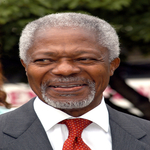
The United States has been faced with an opioid epidemic for well over a decade, a public health crisis that has affected people and families from every demographic. As the nation’s lawmakers address the issue, politicians from both sides of the aisle agree that addiction treatment and education is the most effective weapon. Unfortunately, we cannot reverse the damage that the war on drugs has inflicted on countless Americans, but we can take more humanitarian approach for the future – doing away with many of the nation’s draconian drug laws.
This week, Der Spiegel published an essay written by Nobel Peace Prize winner and former United Nations Secretary-General Kofi Annan. With the use of powerful words, Annan declared that the global war on drugs has done more harm than good, and has given more weight to punishment than health and human rights. It has created the perfect environment for illegal drug manufacturers and distributors to foster. He writes:
“In my experience, good public policy is best shaped by the dispassionate analysis of what in practice has worked, or not. Policy based on common assumptions and popular sentiments can become a recipe for mistaken prescriptions and misguided interventions. Nowhere is this divorce between rhetoric and reality more evident than in the formulation of global drug policies, where too often emotions and ideology rather than evidence have prevailed.”
In April the United Nations General Assembly will hold a special session on drugs, a chance Annan believes for changes to be made regarding global drug policies. He wrote four critical steps that he believes should be accepted and implemented.
1) Decriminalize personal drug use.
2)Accept that a drug-free world is an illusion.
3)Look at regulation and public education rather than the total suppression of drugs.
4)Recognize that drugs must be regulated precisely because they are risky.
Some final thoughts…
At PACE Recovery Center our men’s only extended care drug and alcohol treatment program is built on the idea that by helping the client work on their underlying issues, they will be able to achieve long-term sobriety. PACE’s addiction treatment team incorporates the most effective treatment modalities, which have been proven through empirical research. We will follow with interest the special session on drugs that will be conducted at the United Nations General Assembly.


